|
|
|
Sort Order |
|
|
|
Items / Page
|
|
|
|
|
|
|
| Srl | Item |
| 1 |
ID:
060337
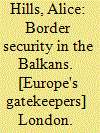

|
|
|
|
|
| Publication |
London, Oxford University Press, 2004.
|
| Description |
88p.
|
| Series |
Adelphi Paper; 371
|
| Standard Number |
0567932X
|
|
|
|
|
|
|
|
|
|
|
|
Copies: C:1/I:0,R:0,Q:0
Circulation
| Accession# | Call# | Current Location | Status | Policy | Location |
| 049457 | 355.47496/HIL 049457 | Main | On Shelf | General | |
|
|
|
|
| 2 |
ID:
084751


|
|
|
|
|
| Publication |
2008.
|
| Summary/Abstract |
Despite decades of police assistance and the recent introduction of reform plans, Nigeria's public police remain notoriously brutal and corrupt. This raises the question of whether even flawed reforms in a relatively democratic environment can make a significant difference to policing standards and practices. Based on developments in the Nigeria Police since 2005, this article suggests that reform can make a normative and organisational difference, but that in the absence of fundamental socio-political change, its effects tend to be superficial, localised and temporary. Reform's dynamic is better understood as a classic dialectic than a serial succession of movements.
|
|
|
|
|
|
|
|
|
|
|
|
|
|
|
|
| 3 |
ID:
052470
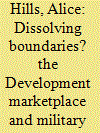

|
|
|
|
|
| Publication |
Dec 2003.
|
| Summary/Abstract |
The extent to which the broadening security agenda should be operationalised by Western military forces is unclear. Prompted by events in Afghanistan during October 2001 and the trend towards regime change and reconstruction, this article uses the notion of civil society as a means to explore the implications of using developmental objectives to shape operations. It argues that civil society's limited utility is most evident when it is applied to urban conflict. Nevertheless, civil society is a significant indicator of trends that may yet shape strategic guidance. This raises questions about the nature and role of military force in the contemporary world, and, indeed, of the new security agenda itself.
|
|
|
|
|
|
|
|
|
|
|
|
|
|
|
|
| 4 |
ID:
178115


|
|
|
|
|
| Summary/Abstract |
Sooner or later, donor-led discussions of state- and institution-building in conflict-affected societies with low literacy rates address the role of police forces, which are to be developed in the light of community-oriented policing. However, the implementation of a basic policing programme in the Somali cities of Kismayo and Baidoa in 2014 raises important questions about the applicability of this approach. It suggests that, rather than police in the western sense of the word, Somali forces are part of an endemic power structure that accommodates and normalizes instability. Focusing on what police officers actually do and on what local residents expect from them, this article uses three practical indicators to explore the factors at work: recruitment, reward (i.e. stipends) and, importantly, retention. This pragmatic approach allows an analytical and empirical exploration of a prototypical form of police and policing in a society lacking meaningful state-based institutions and processes. Specifically, Kismayo's and Baidoa's experience helps to identify the minimal requirements needed for formal policing in unstable societies. It suggests that militia-style policing is residual, rather than novel, and its dynamics are best understood as reflecting a series of social and political influences within unequal fields of power, with the emphasis on exploitation and survival.
|
|
|
|
|
|
|
|
|
|
|
|
|
|
|
|
| 5 |
ID:
090511
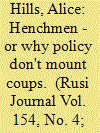

|
|
|
|
|
| Publication |
2009.
|
| Summary/Abstract |
Contemporary security challenges are blurring the boundaries between military and policy forces. In Africa, however, the distinction remains, with policy unable or unwilling to take on a more politicized role. Regardless of rhetoric, regime and resources, senior officers rarely build power bases comparable to those of the military. Police perpetuate rather than create political order, and hence, except in a few examples, do not defy the status quo.
|
|
|
|
|
|
|
|
|
|
|
|
|
|
|
|
| 6 |
ID:
113284
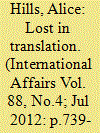

|
|
|
|
|
| Publication |
2012.
|
| Summary/Abstract |
The transfer of democratic values and practices such as community-based policing to African police forces is a key aspect of western aid and security policies, yet the cultural transmission on which it depends is not fully understood; the ways in which African officers respond to theories and practices imported from western societies has yet to be assessed critically. Further, despite decades of international support for police reform and re-education, there is little evidence to support the assumption that the skills, technologies and procedures associated with western policing can act as an effective channel for the transmission of democratic values. This article uses the Nigerian police's response to both externally funded and internally generated reform projects to address a question with implications for policy transfer more generally: what explains the uneven transmission of politically sensitive forms of knowledge? It discusses how imported ideas and practices are received by Nigerian officers and political elites, and how they are transformed having been filtered through local interests and dispositions. It shows that even when the process of reform is accepted, the political will required to ensure its effective implementation is not. Democratic practices do not travel well because recipients respond to imported practices in an adaptive manner, integrating aspects of donor understanding and indigenous realities.
|
|
|
|
|
|
|
|
|
|
|
|
|
|
|
|
| 7 |
ID:
148981


|
|
|
|
|
| Summary/Abstract |
The UK’s multi-agency approach to making Mogadishu safe involves multiple defence and development projects, few of which improve street-level security. For this to happen, the UK must support Somali-led initiatives that collect community intelligence while expressing the value residents place on social capital and information. Alice Hills uses a neighbourhood watch scheme in Waberi District to explore the relationship between counterterrorism and community safety and what it means for UK policy. She finds that Waberi’s cheap and sustainable scheme makes an identifiable contribution to the UK’s security objectives while helping to provide the physical security that Mogadishu’s residents want.
|
|
|
|
|
|
|
|
|
|
|
|
|
|
|
|
| 8 |
ID:
160684
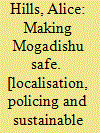

|
|
|
|
|
| Publication |
Abingdon, Routledge, 2018.
|
| Description |
vi, 102p.pbk
|
| Series |
Whitehall Paper; 91
|
| Standard Number |
9781138326880
|
|
|
|
|
|
|
|
|
|
|
|
Copies: C:1/I:0,R:0,Q:0
Circulation
| Accession# | Call# | Current Location | Status | Policy | Location |
| 059494 | 355.005/HIL 059494 | Main | On Shelf | General | |
|
|
|
|
| 9 |
ID:
148454
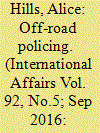

|
|
|
|
|
| Summary/Abstract |
Prompted by the trend to see information and communications technology (ICT) as a tool for capacity building, this article asks whether the use of ICT has—or can—recast centre–periphery relations in a hybrid country such as Somaliland. Taking as its departure point Herbst's observation that a fundamental problem confronting African leaders concerns how to extend or consolidate authority over sparsely settled lands, it uses recent developments in Somaliland's coast guard and immigration police to assess ICT's contribution to changing security provision in remote and coastal areas. This allows for an analysis of Somaliland's law enforcement framework, the relationship between its politics and practice, the practical application of its coercive resources, and the Silanyo government's priorities and preference for consensus and co-existence whenever security imperatives allow. It suggests that ICT can be a desirable operational tool or a variable in existing power networks, but that it does not represent a new mode of security governance. ICT's potential to connect Somaliland's government and populace, and politics and practice, is for now minimal, but identifying the ways in which security actors such as coast guards actually use ICT allows for a more accurate assessment of the variables shaping centre–periphery relations. Contrary to Herbst's observation, the Silanyo government does not need to overtly or systematically extend, consolidate or exert its authority in remote and coastal areas. Spatial metaphors such as centre–periphery help to clarify the situation, but the significance invested in them reflects western rationalities, rather than Somali realities.
|
|
|
|
|
|
|
|
|
|
|
|
|
|
|
|
| 10 |
ID:
131473
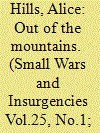

|
|
|
|
|
| Publication |
2014.
|
| Summary/Abstract |
Afghanistan has been the defining experience of conflict for many Western militaries, so it comes as no surprise that Out of the Mountains begins with an account of the author watching a patrol fight its way out of an ambush in a remote valley in Afghanistan. But, rather than projecting this experience as the future course of conflict, David Kilcullen argues that wars in mountainous, landlocked places such as Afghanistan will become increasingly rare. In the future, most conflicts will take place in the urban littoral because that is where most people live.
|
|
|
|
|
|
|
|
|
|
|
|
|
|
|
|
| 11 |
ID:
078695


|
|
|
|
|
| Publication |
2007.
|
| Summary/Abstract |
Africa's police are usually assessed in terms of their adherence to democratic criteria. This results in inaccurate analysis because the police are actually governed according to presidential preference. This article uses the role of Africa's chief police officers to explore the relationship between presidents and their police, and the location of influence within the police. It identifies the significant variables shaping police governance in four countries with comparable institutional structures - Ghana, Kenya, Uganda and Zimbabwe - and confirms the negligible role played by public accountability.
|
|
|
|
|
|
|
|
|
|
|
|
|
|
|
|
| 12 |
ID:
110891


|
|
|
|
|
| Publication |
2012.
|
| Summary/Abstract |
The prevention of inter-communal conflict in cities where multiple religious and secular norms and processes affect the delivery of security and justice is a major challenge for governments and residents. Most analyses of conflict prevention focus on the part played by traditional authorities or civil society associations, downplaying the role of public police forces.Yet fieldwork in Kano, northern Nigeria, suggests that locally appropriate forms of conventional policing can be highly effective in lowering tension. While the need to negotiate with Kano's semi-state and informal policing actors has not reconfigured the Nigerian police's authority practices, Kano's relative stability owes much to the political and technical skills with which senior police officers manage the city's competitive environment.
|
|
|
|
|
|
|
|
|
|
|
|
|
|
|
|
| 13 |
ID:
001894
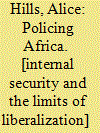

|
|
|
|
|
| Publication |
London, Lynne Rienner, 2000.
|
| Description |
xx, 215p.
|
| Standard Number |
155587715X
|
|
|
|
|
|
|
|
|
|
|
|
Copies: C:1/I:0,R:0,Q:0
Circulation
| Accession# | Call# | Current Location | Status | Policy | Location |
| 042778 | 363.2096/HIL 042778 | Main | On Shelf | General | |
|
|
|
|
| 14 |
ID:
093684


|
|
|
|
|
| Publication |
London, Zed Books, 2009.
|
| Description |
x, 262 p.
|
| Standard Number |
9781842779699
|
|
|
|
|
|
|
|
|
|
|
|
Copies: C:1/I:0,R:0,Q:0
Circulation
| Accession# | Call# | Current Location | Status | Policy | Location |
| 054734 | 341/HIL 054734 | Main | On Shelf | General | |
|
|
|
|
| 15 |
ID:
180655
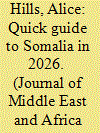

|
|
|
|
|
| Summary/Abstract |
The political and developmental challenges confronting Somalia are entrenched and unlikely to change significantly over the next five years. This is notably so for the transfer of security and policing responsibilities from international organizations to Somali authorities. Consequently, seeking to distinguish between Somalia’s current and future challenges is an artificial exercise that has more to do with the aspirations of the international community than with local realities. Change will undoubtedly occur, but while the strategic issues dominating the international agenda in 2026 will be different from those prioritized in 2021, the underlying trends and issues influencing the goals and behavior of Somalia’s powerbrokers and significant security actors will be much the same as they are today: the security marketplace will continue to reflect the primacy of clan-based calculations and internecine rivalries. In other words, it will be business as usual.
|
|
|
|
|
|
|
|
|
|
|
|
|
|
|
|
| 16 |
ID:
133136


|
|
|
|
|
| Publication |
2014.
|
| Summary/Abstract |
Transforming security governance in areas of limited statehood such as Somalia is notoriously challenging yet international actors continue to try. The uneven record of interventions is partly explained by the resultant projects focusing on the perceived value of what is transmitted, rather than on the way in which it is received, and partly on a misunderstanding of the nature of the security sector to be reformed. The experience of Somalia's three regional police forces emphasizes that security actors operate in a dynamic arena, rather than an institutionalized sector.
|
|
|
|
|
|
|
|
|
|
|
|
|
|
|
|
| 17 |
ID:
131813
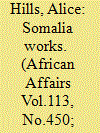

|
|
|
|
|
| Publication |
2014.
|
| Summary/Abstract |
Somalia is an exceptionally insecure state that nevertheless offers an arena in which police officers and institutions can - and do - function. This article argues that Somalia's three regional police forces offer insight into the dynamics that result when locally driven institution-building projects interface with international state-building projects. The resultant picture is nuanced because police negotiate with private actors even as they develop their state-based authority, and their achievements are limited by Somali power brokers sharing a political understanding of security provision, valuing external assistance as a business opportunity, and adapting international models of governance accordingly. Consequently, while the prospects for institution building are favourable, stabilization is unlikely to shift into state building or development.
|
|
|
|
|
|
|
|
|
|
|
|
|
|
|
|
| 18 |
ID:
075086
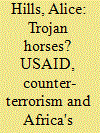

|
|
|
|
|
| Publication |
2006.
|
| Summary/Abstract |
The purpose of US foreign assistance has shifted in the wake of 2001, and Washington has resurrected practices previously associated with police aid during the Cold War. In particular, the Bush administration has broadened the remit of the United States Agency for International Development (usaid) in such a way as to make it a quasi-security agency. The consequences of this could be significant for both usaid and democratic-style police assistance programmes more generally, for today's threat-driven policies are part of a trend which in the past has had worrying consequences. Using the critical variable of public policing (which is illustrated by reference to developments in Kenya), I argue that using usaid to improve the counter-terrorist capacity of Africa's police in the pursuit of US national security objectives is a seriously flawed strategy.
|
|
|
|
|
|
|
|
|
|
|
|
|
|
|
|
| 19 |
ID:
097742


|
|
|
|
|
| Publication |
2010.
|
| Summary/Abstract |
Post-conflict cities represent a laboratory in which to explore the substate orientation of security. Based on an analysis of developments in Baghdad, Basra and Falluja since 2003, this article argues not only that security is inherently selective, but also that the exclusionary actions of local or sectarian groups are more influential than those of state-based agents or projects based on security for the individual. The notion of security can accommodate multiple interpretations, but in practice a dominant discourse controls its meaning, and negotiation soon develops into patterns of domination and exclusion. This typically leads to a 'ghettoization' of security, whereby specific groups are secure only in specific areas. Security thus reflects the sum of myriad local arrangements. The key issue, therefore, is not whether there can be security for all, but the nature of the concessions made by substate and state-based types of security, and the contrast between them and models based on security for the individual.
|
|
|
|
|
|
|
|
|
|
|
|
|
|
|
|
|
|
|
|
|